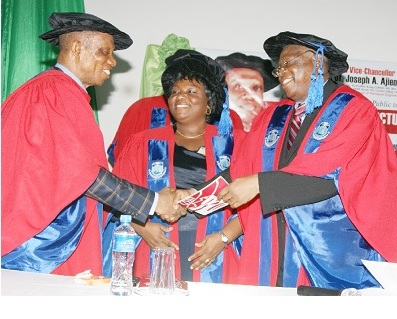PRE-DEGREE/CERTIFICATE REGISTRATION/SCHOOL FEES
119th Inaugural Naanen Lists Pathways To Prosperity In Nigeria
- Details
- Published: 18 June 2015
 By Humphrey Ogu
By Humphrey Ogu
Ways of repositioning Nigeria for accelerated economic prosperity and development formed the main thrust of the 119th Inaugural Lecture delivered by Professor Ben Naanen of the Department of History and Diplomatic Studies in the Faculty of Humanities at the Ebitimi Banigo Auditorium, University Park, last Thursday.
Delivering the lecture entitled, The Prosperity and Poverty of Nations: Using Global Models to Explain and Mitigate Underdevelopment in Nigeria, Naanen cited Singapore and China as prosperous Asian countries, which were once mired in poverty, corruption and underdevelopment. According to him, these countries later attained development and economic prosperity as a result of visionary leaderships that worked for the wellbeing of their entire citizenry, rather than pandering to the pecuniary interest of the parasitic elite class.
Naanen, who called for visionary, decisive and enlightened leadership to move Nigeria to the next level of development, explained that great leadership, strong and effective institutions, including doing the first things first, were needed to achieve prosperity and national greatness for any nation.
“Nigeria is mired in a debilitating cycle of corruption, underdevelopment and poverty. I have argued that the potential solution to our underdevelopment may come more from the political channel than through economic channel.
We need a visionary, enlightened and decisive leadership. We need strong and effective institutions and we need to do the first things first in our pursuit of economic development,” the Inaugural Lecturer declared.
The Professor of Economic History defined poverty as a state of abject want and the absence of the basic needs of life, saying that manifestation of poverty included: lack of money, hunger and malnutrition, illiteracy and ignorance, lack of decent clothing and housing.
He described underdevelopment as a term applied to a society or country that has not attained its full development potentials. “Great nations are never products of accident; rather, they are results of complex and conscious processes of nation-building, social engineering and national sacrifice. There cannot be a great nation without great leaders,” he submitted.
“Great leaders will first conceive a vision, then design a strategy to attain that vision, know where to take their nation and how to arrive at the destination, pursue their vision with focus and integrity, mobilise, inspire and earn the support of their citizens; proceed to build strong institutions and the institutions in turn will define the trajectory of successive leaderships,” the Inaugural Lecturer explained.
“Strong and effective institutions will check corruption, ensure that economic and development policies conceived by the visionary and enlightened leadership work in order to create wealth, ensure the rule of law and that the overwhelming majority of citizens are inspired to do the right thing in order to build a prosperous nation,” Naneen said.
He identified “access to the basic needs and conveniences of life, education, health and sanitation, potable water, electricity, mortality rate, environmental quality and gender equality,” as new indices for distinguishing between growth and development.
He cited the Economic and Financial Crimes Commission (EFCC) and Independent National Electoral Commission (INEC), the Nigerian Police and the Judiciary, as some of the institutions that needed to be strengthened to ensure that a few unruly citizens do not engage in acts of impunity that are detrimental to the interest of the majority.
His words: “In Nigeria, a strong and transparent EFCC, for example, will successfully check financial crimes which result in the looting of the national treasury, undermine confidence in our economy and discourage investors; a strong and honest police will enforce the law without fear or favour; a strong and independent judiciary will interpret the law without fear or favour; a strong INEC will conduct free and fair elections without fear or favour to sustain our democracy.”
Professor Naanen described development as “the incremental improvement in the quality of human life. In ensuring human wellbeing, economic growth must be combined with development.
“There can be no development without growth. But there can be economic growth without development as conventional measurements of growth such as income per capita presuppose the equal distribution of the proceeds of economic growth, which is not correct,” the Professor of Economic History told the huge audience that turned out for the Lecture.
Speaking on behalf of the Vice-Chancellor, Professor Joseph Ajienka, who was away on official assignment, the Deputy Vice-Chancellor in charge of Administration, Professor Ethelbert Nduka, described the Lecture as a very enlightening exercise that needed to be properly digested by policy-makers in Nigeria. Professor Nduka, noted that there were two types of poverty—poverty of the body and poverty of the mind, explaining that people who suffered from poverty of the mind often suffered from poverty of the body too.
“No country can ever develop at the rate of corruption in Nigeria today. As the Inaugural Lecturer suggested, we need visionary leadership in this country if we hope to move forward. It is a visionary leadership that will chart the roadmap for the country to develop,” he said.
“When Americans talk about the American Dream, they are concerned about developing a prosperous nation; conversely, when we hear of the Nigerian Factor, it is all about doing things that are not in tandem with established global best practices. We need to change our attitude by doing things the right way to ensure that Nigeria prospers in the short, medium and long terms if we hope to join the league of progressive nations,” he stated.

